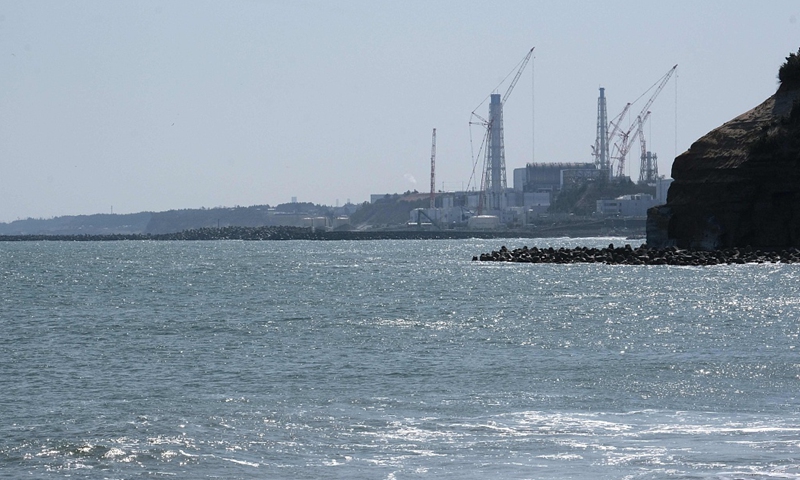Update: US indulgence on Fukushima water disposal a 'political deal' in exchange for Japan's strategic adherence: experts

Photo:VCG
In contrast with the big backlash in the international community especially Japan’s neighboring countries, Washington's indulgence on Tokyo's decision to discharge radioactive water from the Fukushima nuclear plant into the ocean is a "political deal" in exchange for Japan's closer strategic adherence, said Chinese experts.Noting that the US is aware that the Japanese government examined several options related to the management of the treated water, the US government claimed Japan has been "transparent about its decision" and "appears to have adopted an approach in accordance with globally accepted nuclear safety standards," Japanese media outlet Kyodo News reported Tuesday.
US Secretary of State Antony Blinken even tweeted “We thank Japan for its transparent efforts in its decision to dispose of the treated water from the Fukushima Daiichi site.”
However, according to a previous study by Germany's Geomar Helmholtz Centre for Ocean Research, in 57 days, the Fukushima contaminated nuclear waste water will pollute half of the Pacific Ocean, and in three years, Canada and the US will be affected by the nuclear radiation pollution.
Li Haidong, a professor at the Institute of International Relations of the China Foreign Affairs University, told the Global Times on Tuesday that the US' indulgence showed the selfish intentions of its policy for the Asia Pacific region, which was that Washington was putting its narrow-minded strategic interests above the interests of the people from the region and even global human health and safety.
The US collusion with Japan despite the strong opposition from the international community, especially from Japan's neighboring countries, once again reflects the double standards and hypocrisy of the rules-based international order that the US claims to stand for, Li said.
The US is shooting itself in the foot as geographic distance will not mean that the US will face less danger than Japan's neighboring countries, Li warned.
Da Zhigang, director and research fellow of the Institute of Northeast Asian Studies at Heilongjiang Provincial Academy of Social Sciences, also said the indulgence of Western countries led by the US was a "political deal" in exchange for Japan's closer strategic adherence with the US.
The US is attempting to manipulate international opinion and justify the Japanese government's decision, as the Japanese leader is scheduled to hold talks with Joe Biden in the US soon, so it fits the interests of the US not to spoil the occasion, Da said.
According to a report by Kyodo News on Tuesday, Prime Minister Yoshihide Suga will leave Japan for the US on Thursday on a four-day trip to meet US President Joe Biden, Japan's top government spokesperson said Tuesday.
The summit is expected "to further strengthen the Japan-US alliance, which is the cornerstone of Japan's diplomacy and security, and to convey the strong Japan-US relationship to the world," Chief Cabinet Secretary Katsunobu Kato told a press conference in Tokyo.
China's Foreign Ministry spokesperson said Tuesday that as a close neighbor of Japan and a stake holder, China strongly urges Japan to re-examine its decision to dispose of the nuclear waste water and refrain from starting the discharge before reaching agreements with all relevant countries and the International Atomic Energy Agency (IAEA) via full consultation.
The spokesperson stressed that the ocean is the common property of mankind, and the disposal of nuclear waste is not a domestic issue for Japan. China urges Japan to adopt a scientific attitude, fulfill its international obligations, and respond to the serious concerns of the international community, neighboring countries and its own people.
The decision by the Japanese government also faced a strong backlash among the public in the international community.
Second Vice Foreign Minister Choi Jong-moon on Tuesday summoned Japanese Ambassador Koichi Aiboshi and lodged a solemn protest to Japan over the controversial issue. Choi is expected to demand that Japan be transparent and open about the treatment of water at the Fukushima nuclear plant and accept inspections, Yonhap News Agency reported.
Environmental protection NGO Greenpeace East Asia condemned the decision, saying that it "completely disregards the human rights and interests of the people in Fukushima, wider Japan and the Asia-Pacific region," according to a statement sent to the Global Times.
The NGO criticized the Japanese government, saying it “has discounted the radiation risks and turned its back on the clear evidence that sufficient storage capacity is available on the nuclear site as well as in surrounding districts. Rather than using the best available technology to minimize radiation hazards by storing and processing the water over the long term, they have opted for the cheapest option - dumping the water into the Pacific Ocean.”
Many residents in South Korea on Tuesday took to the streets to protest, demanding that Japan "immediately withdraw this decision."
Tokyo also witness similar large-scale protests.
A Japanese NGO for the second generation of victims of nuclear bombings has handed over a petition objecting to the government's decision, demanding that it be withdrawn, Kyodo News said.
The petition noted that the Japanese government and Tokyo Electric Power Company should be held responsible for the major accident at the nuclear power plant.
Many Japanese netizens also objected to the decision.
The Japanese government should have invited the IAEA to investigate the waste water and demonstrated the safety of the treated water to the international community, said one netizen.
If it was really okay to release the waste water into the ocean, the IAEA should endorse it and dump it into Tokyo Bay, read another comment.
"I am a citizen of Fukushima Prefecture. The decision was cruel," said a netizen, noting that "the image of the prefecture and the local fishery industry will 100 percent be damaged, something only the immediate victims would know."



